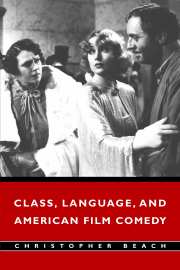Book contents
- Frontmatter
- Contents
- Acknowledgments
- Introduction
- 1 A Troubled Paradise: Utopia and Transgression in Comedies of the Early 1930s
- 2 Working Ladies and Forgotten Men: Class Divisions in Romantic Comedy, 1934–1937
- 3 “The Split-Pea Soup and the Succotash”: Frank Capra's 1930s Comedies and the Subject of Class
- 4 Is Class Necessary?: Preston Sturges and Howard Hawks in the Early 1940s
- 5 Desperately Seeking Status: Class, Gender, and Social Anxiety in Postwar Hollywood Comedy
- 6 Is There a Class in This Text?: Woody Allen and Postmodern Comedy
- 7 Yuppies and Other Strangers: Class Satire and Cultural Clash in Contemporary Film Comedy
- Notes
- Works Cited
- Index
6 - Is There a Class in This Text?: Woody Allen and Postmodern Comedy
Published online by Cambridge University Press: 02 December 2009
- Frontmatter
- Contents
- Acknowledgments
- Introduction
- 1 A Troubled Paradise: Utopia and Transgression in Comedies of the Early 1930s
- 2 Working Ladies and Forgotten Men: Class Divisions in Romantic Comedy, 1934–1937
- 3 “The Split-Pea Soup and the Succotash”: Frank Capra's 1930s Comedies and the Subject of Class
- 4 Is Class Necessary?: Preston Sturges and Howard Hawks in the Early 1940s
- 5 Desperately Seeking Status: Class, Gender, and Social Anxiety in Postwar Hollywood Comedy
- 6 Is There a Class in This Text?: Woody Allen and Postmodern Comedy
- 7 Yuppies and Other Strangers: Class Satire and Cultural Clash in Contemporary Film Comedy
- Notes
- Works Cited
- Index
Summary
The conflict is no longer about: Can I find work?
Can I cope with nuts and bolts in a factory?
It is: Can I stand the stress and pressure
of working in an affluent society?
Woody AllenThe world depicted in the American comedies of the 1920s and 1930s underwent a radical shift in the postwar era, necessitating an equally fundamental change in the dominant modes of film comedy. While the Marx Brothers films engage in a certain amount of more open-ended parody (particularly in their more “anarchic” films like Duck Soup), the primary mode of their humor is satirical. It is directed at particular institutions, milieus, professions, and social classes. In Woody Allen's films, on the other hand, although a good deal of direct social and political satire remains, the dominant mode is parodic.
Allen's filmic oeuvre is often cited as the paradigmatic example of comic postmodernism, and Allen's work as an intertextual or metareferential filmmaker has attracted the attention of numerous commentators. From his first film, What's Up, Tiger Lily? (1967), a re-edited and redubbed version of a Japanese James Bond-type thriller, through more fully realized parodies such as Take the Money and Run (1969), Stardust Memories (1980), Zelig (1983), and The Purple Rose of Cairo (1985), Allen has made consistent use of parodic elements in his films. Yet at the same time we can read Allen as a highly effective social satirist, a filmmaker determined to expose the hypocrisies and excesses of contemporary American life and to analyze the foibles of various cultural milieus.
- Type
- Chapter
- Information
- Class, Language, and American Film Comedy , pp. 155 - 178Publisher: Cambridge University PressPrint publication year: 2002



